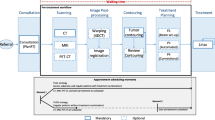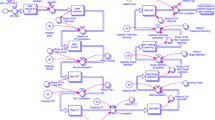Abstract
An automated physicist on-call program was developed to support emergency radiotherapy in a cancer centre. A computer program was created to generate an on-call schedule according to the credit score approach. Monte Carlo method was used to simulate the number of treatment cases per shift of on-call physicists (total 32) based on 8 years of data (2010–2017), and the “Most Credit First” criteria was used to justify the order of physicists in the schedule. Evaluation of the old schedule, in which the physicists were randomly assigned, with the new one was carried out. The deviations of mean for the number of shifts and treatment cases for every physicist were determined between the new and old schedule. By considering the on-call physicists who contributed more than or equal to 10 shifts of treatment cases in 2010–2017, in the old schedule there were 6 physicists having shifts and treatment cases greater than 30% of the mean values. While in the new schedule, nobody has similar workloads over 30% of the mean during the same year range. Using the new scheduling method, the mean number of shifts was reduced from 16.5 to 11.8 per physicist, and the mean number of treatment cases was reduced from 25.6 to 19.7 per physicist, as compared to the old schedule. It is concluded that our new method based on Monte Carlo simulation and credit score approach can produce a more equitable physicist on-call schedule for a list of physicists in the emergency radiotherapy program. The workload balance using our new method is better than our old method that assigned physicists randomly.


Similar content being viewed by others
References
Mitera G, Swaminath A, Wong S, Goh P, Robson S, Sinclair E, Danjoux C, Chow E (2009) Radiotherapy for oncologic emergencies on weekends: examining reasons for treatment and patterns of practice at a Canadian cancer centre. Curr Oncol 16:55–60
Andersson L, Sousa P (1998) An innovative way of caring: palliative radiation therapy rapid response clinic. Can Oncol Nurs J 8:146–147
Danjoux C, Chow E, Drossos A, Holden L, Hayter C, Tsao M, Barnes T, Sinclair E, Farhadian M (2006) An innovative rapid response radiotherapy program to reduce waiting time for palliative radiotherapy. Support Care Cancer 14:38–43
Christian E, Adamietz I, Willich N, Schafer U, Micke O (2008) Radiotherapy in oncological emergenciesfinal results of a patterns of care study in Germany, Austria and Switzerland. Acta Oncol 47:81–89
Kwok Y, DeYoung C, Garofalo M, Dhople A, Regine W (2006) Radiation oncology emergencies. Hematol Oncol Clin N Am 20:505–522
Abdou H, Pointon J (2011) Credit scoring, statistical techniques and evaluation criteria: a review of the literature. Intell Syst Acc Financ Manag 18:59–88
Binder K, Heermann D, Roelofs L, Mallinckrodt AJ, McKay S (1993) Monte Carlo simulation in statistical physics. Comput Phys 7(2):156–157
Kennedy MH (2009) Simulation modeling for the health care manager. Healthc Manag 28(3):246–252
Antognini JM, Antognini JF, Khatri V (2015) How many operating rooms are needed to manage non-elective surgical cases? a Monte Carlo simulation study. BMC Health Serv Res 15(1):487
Liu TM (2012) A generic bed planning model. Doctoral dissertation, University of Toronto, Canada
Author information
Authors and Affiliations
Corresponding author
Ethics declarations
Conflict of interest
X Bauza and James C. L. Chow have no conflict of interest.
Ethical approval
This article does not contain any studies with human participants or animals performed by any of the authors.
Rights and permissions
About this article
Cite this article
Bauza, X., Chow, J.C.L. An automated scheduling system for radiotherapy physicist on-call using Monte Carlo simulation. Australas Phys Eng Sci Med 42, 27–32 (2019). https://doi.org/10.1007/s13246-018-0705-0
Received:
Accepted:
Published:
Issue Date:
DOI: https://doi.org/10.1007/s13246-018-0705-0




